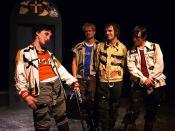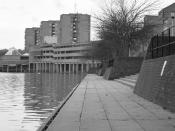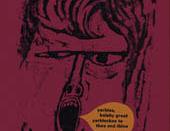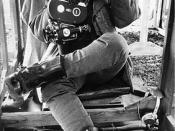Without loneliness, how could we appreciate love? Without war, how could we appreciate peace? Binary opposition underlies the essence of our world. It is because of this that the term ÃÂUtopiaÃÂ, usually meaning a place of utmost perfection, is also used to mean an unrealistic ideal that is impossible to achieve. This has, in turn, spawned the concept of dystopia ÃÂ a negative utopia, being a totalitarian and repressive world where the state holds all power over nearly every aspect of public and private life.
A recurring theme in the Utopian genre is the resulting creation of a dystopia in an effort to reach Utopia. Two novels which clearly illustrate this convention are Aldous HuxleyÃÂs ÃÂBrave New WorldÃÂ and Anthony BurgessÃÂ ÃÂA Clockwork OrangeÃÂ, later adapted by Stanley Kubrick as a film. Other conventions of the Utopian genre include lack of depth of characterization, and the textÃÂs ability to analyse the state of the society in which it was written and to provide an array of possibilities for the future.
ÃÂBrave New WorldÃÂ presents a satiric dystopia as humanity lives in a carefree, healthy, and technologically advanced society. However, all forms of human expression have been sacrificed as, Mustapha Mond states, ÃÂYouÃÂve got to choose between happiness and what people used to call high art. WeÃÂve sacrificed the high art.ÃÂ We also find that Mond and the other World Controllers have a monopoly on historical knowledge, which ensures their positions of power. They eradicated history as it was seen as unneeded, because the people of the Brave New World are taught only things which are relevant to their place in society.
Set in a dystopian near future, ÃÂA Clockwork OrangeÃÂ shows Alex, a 15-year-old boy who roams the streets at night with his gang members, committing violent crimes for fun. ÃÂA Clockwork OrangeÃÂ follows the utopian convention of the state attempting to create a utopia by controlling the individual, as Alex is used as an example of the stateÃÂs power to "rehabilitate" criminals by conditioning them to associate violent acts with a sensation of severe physical illness. Through this, the government eliminates the very thing that constitutes AlexÃÂs humanity; as the novel says, ÃÂA man who cannot choose ceases to be a man.ÃÂ Burgess suggests that a society in which the state has so much power, is one in which individual liberties are crushed. In the film adaptation, the song Alex whistles on his way home from his evening of violence is actually a modern adaptation of the Funeral March of Queen Mary II written by Henry Purcell in 1694. It is as though Alex is whistling an eulogy to the end of the world.
As can be seen, it is impossible to create a Utopia without suppressing individual liberties for the greater good of the state, which would create a most totalitarian and repressive society ÃÂ a dystopia.
Texts of the Utopian genre often exist to analyse the context in which they were written, and offer warnings of what our society potentially could become. Written during the post World War I era, ÃÂBrave New WorldÃÂ takes a satirical look into the future as it addresses the struggle for peace, the development of science, and the extremes of totalitarianism. The World State's Motto, "Community, Identity, Stability", mirror how the majority of the world craved peace and stability, following the turmoil of World War I. This struggle is realized in Huxley's Brave New World, but at a price; the abandonment of individuality and the freedom of individual thought in a world kept together by extensive human conditioning.
Burgess was inspired to write ÃÂA Clockwork OrangeÃÂ during a visit to Russia, where he observed the repressive atmosphere of a communist nation. Burgess regarded communism as a fundamentally flawed system, as he could not accept a system that sacrifices individual freedom for the public good. This is reflected in ÃÂA Clockwork OrangeÃÂ as it seems to attack communism through its extremely negative portrayal of a government that seeks to solve social problems by removing freedom of choice.
Stanley KubrickÃÂs adaptation of ÃÂA Clockwork OrangeÃÂ, made in 1971, differs significantly from the novel as it excludes the entire 21st chapter of the novel. The first American edition of the novel also excluded this chapter, where Alex begins to feel older grows weary of violence. Perhaps, given American traditions and morality, the publisher thought that having Alex become "good" by his own free will was not the right thing. This clearly illustrates how a Utopian text does, in fact, reflect upon the state of society during the time in which it was written.
As in most works about Utopia, ÃÂBrave New WorldÃÂ lacks the complexity of characterization that marks other kinds of great novels as the characters mostly exist to voice ideas in words or to embody them in their behaviour, rather than to represent actual people. It is almost as if the totalitarian Brave New World becomes the novelÃÂs main character. This lack of complexity of characterization can also be seen in A Clockwork Orange, as the only character given much depth is the protagonist, Alex. All other characters seem to exist in order to either personify ideas, or merely to move the story along.
As can be seen through the conventions of the utopian genre which ÃÂBrave New WorldÃÂ and both the film adaptation and novel ÃÂA Clockwork OrangeÃÂ present, it is impossible to create a Utopia without inevitably creating a dystopia ÃÂ where the state holds all power over its citizens.
Bibliography:'Brave New World' - Aldous Huxley'A Clockwork Orange' (novel) - Anthony Burgess'A Clockwork Orange' (film) - Stanley Kubrick





